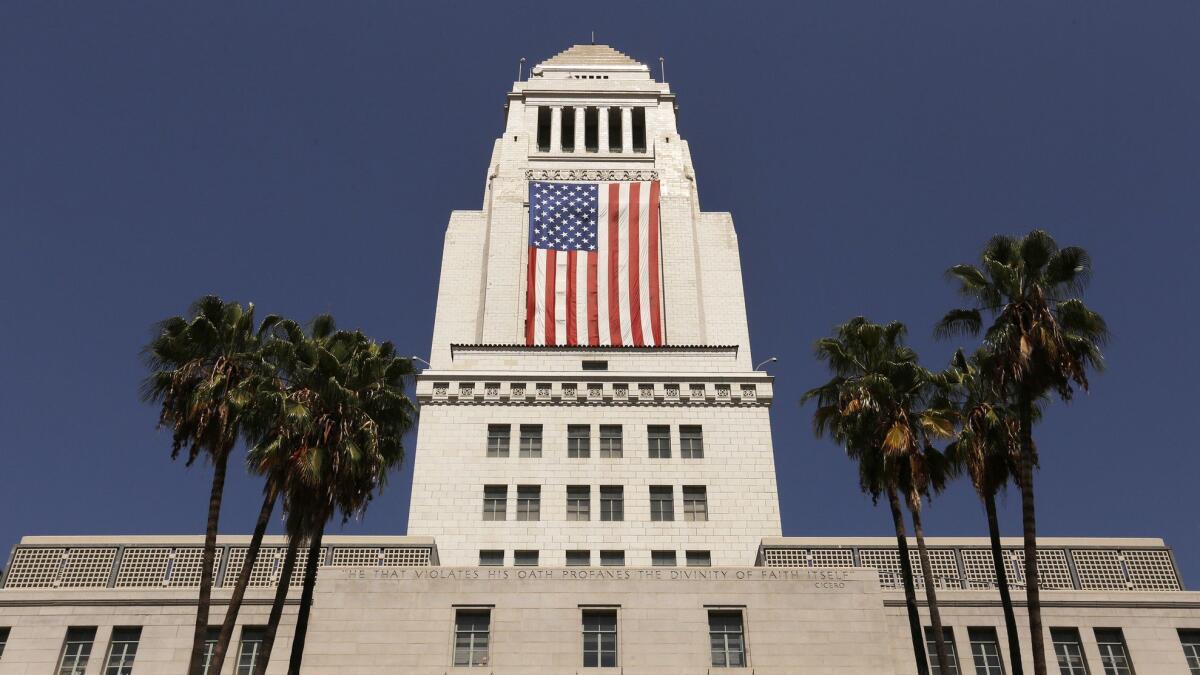L.A. says it banned developer political contributions. But the job is only half-finished

- Share via
The Los Angeles City Council struck a blow Wednesday against the pay-to-play culture at City Hall. After putting it off for many months, the council finally voted to ban campaign contributions from real estate developers with projects needing city approval.
The vote was a sign of some progress. The mere exchange of money between people seeking city approval for projects and the people granting it creates the perception of a quid pro quo — and in some cases, more than merely a perception. That’s why Los Angeles already bars campaign contributions from registered lobbyists and bidders for city contracts. Under the new law, the ban will be extended to developers seeking approval for projects.
But hold your enthusiasm. For one thing, the council delayed the ban until after the 2022 primary election — when several council incumbents will be running for reelection.
Furthermore, the law does not prohibit developers from hosting fundraisers or raising money from other donors. And while a “developer” is defined as the property owner or applicant, including top executives or people who own a significant stake in the company, the ban does not cover subcontractors, consultants or people on the project team. That’s a limitation, advocates say, that would still allow real estate interests to try and sway decision makers.
Worst of all, council members refused to close a big loophole: “behested payments,” in which politicians ask developers, lobbyists and people with city contracts to make contributions to particular charities. Behested payments may sound like a good thing on the surface — it’s charity, after all — but in fact they are just another mechanism by which politicians squeeze money out of people doing business with the city, and direct it where they want it to go. So while developers will no longer be able to make campaign contributions, council members or the mayor will still be able to hit them up to make hefty charitable contributions.
The council could at least have made the process more transparent, but members also punted on a proposal to require disclosure of any behested contribution above $1,000. Instead, they left the disclosure threshold at $5,000, at least for now.
Council members said they were worried that charitable giving would dry up if they could no longer personally shake down developers, lobbyists and contract bidders for donations. But that fear acknowledges the reality behind political fundraising: Whether it’s a large campaign donation or a behested contribution to a charity, money is being exchanged in most cases with the intent to curry favor with an elected official. That’s why more than half of behested payments reported by L.A. politicians over the last five years came from donors with business before City Hall.
The public needs to keep up the pressure on City Hall to ban behested contributions from donors with business pending before the city. It’s worth remembering that the path to reform is difficult and time-consuming. There have long been allegations of pay-to-play politics in Los Angeles, particularly with real estate developers who need support from the City Council or the mayor to get their projects built. Councilman David Ryu, who pledged not to take developer contributions when he ran for office in 2015, found little support for campaign finance reform after he was elected.
City leaders started discussing changes only after a 2016 Times investigation into an L.A. developer accused of making illegal donations to local politicians while pushing them to support his $72-million Sea Breeze apartment project, which was approved.
Council members eventually proposed the ban on developer contributions in January 2017 as an attempt to counter the perception that elected officials approve big real estate projects because they receive campaign contributions from the developers, and to defuse one of the main arguments behind a ballot initiative to limit growth. When the measure failed in 2017, the proposed ban stalled.
The ban was revived earlier this year — after the FBI raided the home and offices of Councilman Jose Huizar, who heads the powerful council committee that oversees development decisions. The raid was part of a larger corruption probe that appeared to be focused on real estate projects downtown, and sought information from offices of several elected officials. No one has been publicly charged with a crime.
Apparently it takes a scandal to get City Hall to make ethics reforms. So what scandal will get city leaders to do what’s right on behested payments?
More to Read
A cure for the common opinion
Get thought-provoking perspectives with our weekly newsletter.
You may occasionally receive promotional content from the Los Angeles Times.









